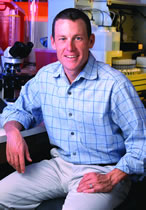

|
Lance Armstrong
 Lance
Armstrong began his athletic career as a professional triathlete at age
16. Deciding that he was "born to race bikes," Lance qualified
to train with the U.S. Olympic team in Colorado Springs, CO, during his
senior year of high school. Once he graduated, he decided to concentrate
on cycling full-time. By 1991, he became the U.S. National Amateur Champion
and finished 14th in the 1992 Olympic games in Barcelona, Spain. After
turning professional, Lance won many titles including: the 1993 World Champion,
U.S. PRO Champion, a 1993 stage victory at the Tour de France, the 1994
Thrift Drug Triple Crown, and the 1995 Tour Du Pont. On top of these
accomplishments, Lance was named the 1995 Velo New American Male Cyclist
of the Year. Lance
Armstrong began his athletic career as a professional triathlete at age
16. Deciding that he was "born to race bikes," Lance qualified
to train with the U.S. Olympic team in Colorado Springs, CO, during his
senior year of high school. Once he graduated, he decided to concentrate
on cycling full-time. By 1991, he became the U.S. National Amateur Champion
and finished 14th in the 1992 Olympic games in Barcelona, Spain. After
turning professional, Lance won many titles including: the 1993 World Champion,
U.S. PRO Champion, a 1993 stage victory at the Tour de France, the 1994
Thrift Drug Triple Crown, and the 1995 Tour Du Pont. On top of these
accomplishments, Lance was named the 1995 Velo New American Male Cyclist
of the Year.
Lance hit
a hurdle in 1996 when he was diagnosed with advanced testicular cancer
that had also produced tumors in his lungs and lesions in his brain. He
was only 25 years old. Given a 50 percent chance of survival, Lance underwent
three surgeries and aggressive chemotherapy treatment. Throughout his
life-threatening ordeal, Lance never gave up hope. He returned to racing
in 1998 and won the Tour de France seven times since.
Lance has
translated his success into hope for uncounted individuals who face cancer
every day. He established The Lance Armstrong Foundation to promote cancer
research and awareness, and, together with his foundation, partnered with
Bristol-Myers Squibb to create the Cycle of Hope, an education
campaign that helps people with cancer, those at risk, and their loved
ones turn their fears about cancer into hope.
|

Cancer Survivor and Three-Time Tour de France Winner Lance Armstrong Champions
the Cause for Cancer Research and Clinical Studies
Cancer is a disease that touches everyone. More than one million Americans
are diagnosed with cancer every year, making the odds of cancer striking close
to home pretty likely. No doubt you, a family member, or someone you know has
been affected by cancer.
For the millions of people living with, through and beyond cancer, and for
those at high risk of developing cancer, medical research and cancer clinical trials provide hope and a number of other benefits.
When I was diagnosed with advanced testicular cancer, I felt fearful, but I
quickly learned from my doctors that thanks to research, new treatments were
available for my cancer that weren't around just 10 years before. Although I
did not participate in a study, I benefited from the hundreds of patients before
me who enrolled in clinical trials to find a cure for this once-deadly form
of cancer.
Unfortunately, many cancer patients don't even know that clinical studies are
an option. Many don't understand the research and don't have the information
necessary to decide if clinical trials are right for them. Our race against
cancer depends on more people understanding that trials are safe, accessible
and necessary. We must increase participation in clinical trials. Only then
can we approach the finish line in our race for a cancer cure.
Doctors and research scientists are dedicated to developing new ways of treating
cancer. Each day, they strive to uncover the secrets surrounding the disease.
Thousands of people, both healthy and sick, have contributed to medical research
by entering into clinical trials to test new treatment approaches. I credit
my own victory against cancer to the many men, women, and children who joined
a clinical trial and helped move us further along the road to victory by turning
experimental drugs into effective treatments. If it had not been for them, I
do not believe I would be alive today. They are the true cancer champions.
But the race is far from over. We have made great progress in cancer prevention,
diagnosis, and treatment, but we haven't crossed the finish line yet. Success-winning
the race, finding a cure-still lies ahead, inspiring us to push our limits.
More people are needed to help us reach that finish line. If you have cancer,
you can learn more about clinical trials and may consider enrolling in one that
is right for you.
Today, I am determined to let everyone know that we can
beat this disease if more people participate in cancer research. Clinical trials
are responsible for the steady progress and breakthroughs that have been made
to help cure cancer. From the scientific point of view, clinical trials are
designed to help find safer, more effective treatments for cancer patients.
From a patient's viewpoint, clinical trials offer quality, state-of-the-art
technology and treatment options.
I am urging everyone to learn more about cancer clinical trials and get advice
and support from experts. Visit www.cycleofhope.org to
find out if cancer clinical trials are right for you. The Web site has easy
to understand information about risks, symptoms, treatment, cancer research,
and what to expect during and after a cancer diagnosis. The site will also recognize
research heroes - the scientists behind the studies and the patients who enroll
in them.
Increasing participation in clinical trials today is one of the best ways to
find a cure for tomorrow.
Click here for more information on cancer .
Click here for more information on clinical trials.

Created: 6/1/2002 - Lance Armstrong



